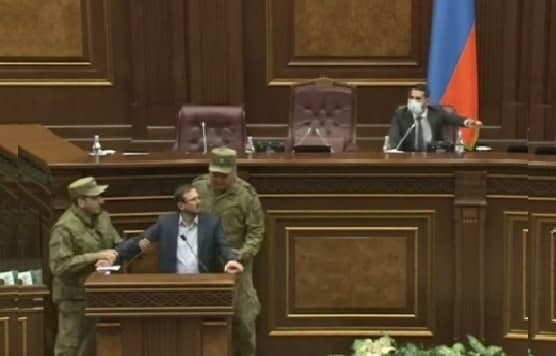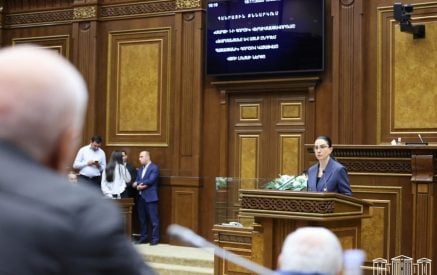On September 26, 1996, after a mob sympathizing with Vazgen Manukyan stormed the National Assembly and beat the Speaker and Vice Speaker of the National Assembly, NDU MP Shavarsh Kocharyan approached the podium to address the sitting. His PANM colleagues, considering that S. Kocharyan was one of the culprits of the events of the previous night, started pulling him from the podium and tried to hit him. The special detachments got involved in the fight, dragging the deputies in different directions. The public opinion was on the side of the NDU members. Most of the people were not interested in the beating of the National Assembly leaders, and they were full of hatred towards the PANM and Ter-Petrossian. They considered the opposition’s struggle fair. (Naturally, my observations on public opinion are subjective; there is no reliable sociological data on this issue).
In July 2002, the parliament passed the so-called “law on giving warnings.” The background was as follows. Opposition MPs from time to time “occupied” the podium of the parliament and did not allow the sitting to continue until the issues of interest to them were discussed. Then-President Robert Kocharyan publicly (in a televised interview) instructed his parliamentary majority to pass a law that would “warn” the opposition deputies; in other words, the police would forcibly remove deputies from the podium. Public opinion was again on the side of the opposition, as the majority of people were filled with hatred towards R. Kocharyan.
From this point of view, Pashinyan continues the political line of the second president or, one might say, the “style of ruling,” which is probably due to the similarity of their characters (elements of narcissism). The current Prime Minister has gone further; in the past, they “gave warnings” to block the tribune, and now, they just give speeches when the government hears unpleasant remarks are heard. No matter how much I agree with those statements, using the police to slap MPs in the mouth is not the best democratic practice. But let us also state that the public opinion in this case is in favor of the government because the majority of citizens are full of hatred towards Robert Kocharyan, Serzh Sargsyan, and the political forces that have cooperated and are cooperating with them. No matter what the current opposition MPs say, it will not be positively perceived by that majority.
… And democracy or the rule of law is the last issue that these people are interested in.
Read also
Aram Abrahamyan























































